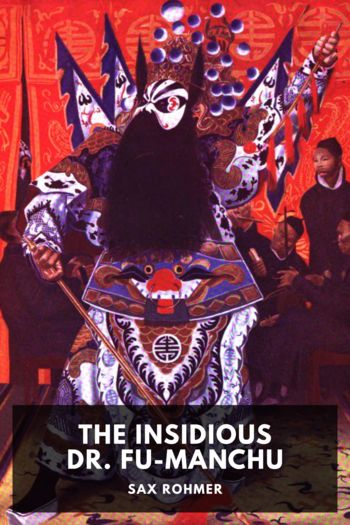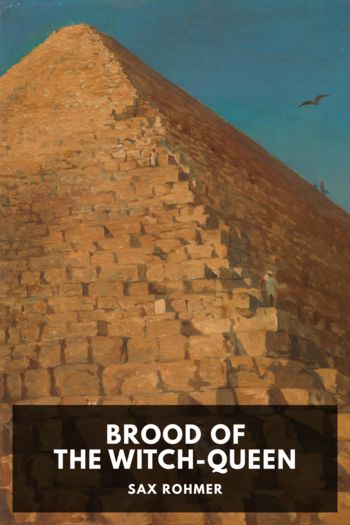The Insidious Dr. Fu Manchu - Sax Rohmer (best ebook reader TXT) 📗

- Author: Sax Rohmer
- Performer: -
Book online «The Insidious Dr. Fu Manchu - Sax Rohmer (best ebook reader TXT) 📗». Author Sax Rohmer
Inspector Weymouth, and Dr. Fu-Manchu, were swallowed up
by the river, Fu-Manchu held a poisoned needle in his hand.
The laughter meant that the needle had done its work.
Your brother had become mad!”
Weymouth turned aside to hide his emotion. “What was on the needle?”
he asked huskily.
“It was something which he prepared from the venom of a kind of swamp adder,”
she answered. “It produces madness, but not always death.”
“He would have had a poor chance,” said Smith, “even had he been in complete
possession of his senses. At the time of the encounter we must have been
some considerable distance from shore, and the fog was impenetrable.”
“But how do you account for the fact that neither of the bodies
have been recovered?”
“Ryman of the river police tells me that persons lost at that point
are not always recovered—or not until a considerable time later.”
There was a faint sound from the room above. The news of that
tragic happening out in the mist upon the Thames had prostrated
poor Mrs. Weymouth.
“She hasn’t been told half the truth,” said her brother-in-law. “She doesn’t
know about—the poisoned needle. What kind of fiend was this Dr. Fu-Manchu?”
He burst out into a sudden blaze of furious resentment. “John never told
me much, and you have let mighty little leak into the papers. What was he?
Who was he?”
Half he addressed the words to Smith, half to Karamaneh.
“Dr. Fu-Manchu,” replied the former, “was the ultimate expression of
Chinese cunning; a phenomenon such as occurs but once in many generations.
He was a superman of incredible genius, who, had he willed,
could have revolutionized science. There is a superstition in some
parts of China according to which, under certain peculiar conditions
(one of which is proximity to a deserted burial-ground) an evil spirit
of incredible age may enter unto the body of a new-born infant.
All my efforts thus far have not availed me to trace the genealogy
of the man called Dr. Fu-Manchu. Even Karamaneh cannot help me in this.
But I have sometimes thought that he was a member of a certain very old
Kiangsu family—and that the peculiar conditions I have mentioned
prevailed at his birth!”
Smith, observing our looks of amazement, laughed shortly,
and quite mirthlessly.
“Poor old Weymouth!” he jerked. “I suppose my labors are finished;
but I am far from triumphant. Is there any improvement in
Mrs. Weymouth’s condition?”
“Very little,” was the reply; “she has lain in a semi-conscious
state since the news came. No one had any idea she would
take it so. At one time we were afraid her brain was going.
She seemed to have delusions.”
Smith spun round upon Weymouth.
“Of what nature?” he asked rapidly.
The other pulled nervously at his mustache.
“My wife has been staying with her,” he explained, “since—it happened;
and for the last three nights poor John’s widow has cried out at
the same time—half-past two—that someone was knocking on the door.”
“What door?”
“That door yonder—the street door.”
All our eyes turned in the direction indicated.
“John often came home at half-past two from the Yard,” continued Weymouth;
“so we naturally thought poor Mary was wandering in her mind.
But last night—and it’s not to be wondered at—my wife couldn’t sleep,
and she was wide awake at half-past two.”
“Well?”
Nayland Smith was standing before him, alert, bright-eyed.
“She heard it, too!”
The sun was streaming into the cozy little sitting-room;
but I will confess that Weymouth’s words chilled me uncannily.
Karamaneh laid her hand upon mine, in a quaint, childish fashion
peculiarly her own. Her hand was cold, but its touch thrilled me.
For Karamaneh was not a child, but a rarely beautiful girl—
a pearl of the East such as many a monarch has fought for.
“What then?” asked Smith.
“She was afraid to move—afraid to look from the window!”
My friend turned and stared hard at me.
“A subjective hallucination, Petrie?”
“In all probability,” I replied. “You should arrange that
your wife be relieved in her trying duties, Mr. Weymouth.
It is too great a strain for an inexperienced nurse.”
OF all that we had hoped for in our pursuit of Fu-Manchu how
little had we accomplished. Excepting Karamaneh and her brother
(who were victims and not creatures of the Chinese doctor’s)
not one of the formidable group had fallen alive into our hands.
Dreadful crimes had marked Fu-Manchu’s passage through the land.
Not one-half of the truth (and nothing of the later developments)
had been made public. Nayland Smith’s authority was sufficient
to control the press.
In the absence of such a veto a veritable panic must have seized upon
the entire country; for a monster—a thing more than humanly evil—
existed in our midst.
Always Fu-Manchu’s secret activities had centered about the great waterway.
There was much of poetic justice in his end; for the Thames had claimed him,
who so long had used the stream as a highway for the passage to and fro for
his secret forces. Gone now were the yellow men who had been the instruments
of his evil will; gone was the giant intellect which had controlled
the complex murder machine. Karamaneh, whose beauty he had used as a lure,
at last was free, and no more with her smile would tempt men to death—
that her brother might live.
Many there are, I doubt not, who will regard the Eastern girl with horror.
I ask their forgiveness in that I regarded her quite differently.
No man having seen her could have condemned her unheard. Many, having looked
into her lovely eyes, had they found there what I found, must have forgiven
her almost any crime.
That she valued human life but little was no matter for wonder.
Her nationality—her history—furnished adequate excuse for an attitude
not condonable in a European equally cultured.
But indeed let me confess that hers was a nature incomprehensible to me
in some respects. The soul of Karamaneh was a closed book to my short-sighted
Western eyes. But the body of Karamaneh was exquisite; her beauty of a kind
that was a key to the most extravagant rhapsodies of Eastern poets.
Her eyes held a challenge wholly Oriental in its appeal; her lips,
even in repose, were a taunt. And, herein, East is West and West is East.
Finally, despite her lurid history, despite the scornful self-possession
of which I knew her capable, she was an unprotected girl—
in years, I believe, a mere child—whom Fate had cast in my way.
At her request, we had booked passages for her brother and herself
to Egypt. The boat sailed in three days. But Karamaneh’s beautiful
eyes were sad; often I detected tears on the black lashes.
Shall I endeavor to describe my own tumultuous, conflicting emotions?
It would be useless, since I know it to be impossible.
For in those dark eyes burned a fire I might not see; those silken
lashes veiled a message I dared not read.
Nayland Smith was not blind to the facts of the complicated situation.
I can truthfully assert that he was the only man of my acquaintance who,
having come in contact with Karamaneh, had kept his head.
We endeavored to divert her mind from the recent tragedies by a round
of amusements, though with poor Weymouth’s body still at the mercy
of unknown waters Smith and I made but a poor show of gayety;
and I took a gloomy pride in the admiration which our lovely
companion everywhere excited. I learned, in those days, how rare
a thing in nature is a really beautiful woman.
One afternoon we found ourselves at an exhibition of water
colors in Bond Street. Karamaneh was intensely interested
in the subjects of the drawings—which were entirely Egyptian.
As usual, she furnished matter for comment amongst the other visitors,
as did the boy, Aziz, her brother, anew upon the world from his
living grave in the house of Dr. Fu-Manchu.
Suddenly Aziz clutched at his sister’s arm, whispering rapidly in Arabic.
I saw her peachlike color fade; saw her become pale and wild-eyed—
the haunted Karamaneh of the old days.
She turned to me.
“Dr. Petrie—he says that Fu-Manchu is here!”
“Where?”
Nayland Smith rapped out the question violently, turning in a flash
from the picture which he was examining.
“In this room!” she whispered glancing furtively, affrightedly about her.
“Something tells Aziz when HE is near—and I, too, feel strangely afraid.
Oh, can it be that he is not dead!”
She held my arm tightly. Her brother was searching the room with big,
velvet black eyes. I studied the faces of the several visitors;
and Smith was staring about him with the old alert look, and tugging
nervously at the lobe of his ear. The name of the giant foe of the white
race instantaneously had strung him up to a pitch of supreme intensity.
Our united scrutinies discovered no figure which could have been
that of the Chinese doctor. Who could mistake that long, gaunt shape,
with the high, mummy-like shoulders, and the indescribable gait,
which I can only liken to that of an awkward cat?
Then, over the heads of a group of people who stood by the doorway, I saw
Smith peering at someone—at someone who passed across the outer room.
Stepping aside, I, too, obtained a glimpse of this person.
As I saw him, he was a tall, old man, wearing a black Inverness
coat and a rather shabby silk hat. He had long white hair
and a patriarchal beard, wore smoked glasses and walked slowly,
leaning upon a stick.
Smith’s gaunt face paled. With a rapid glance at Karamaneh,
he made off across the room.
Could it be Dr. Fu-Manchu?
Many days had passed since, already half-choked by Inspector Weymouth’s iron
grip, Fu-Manchu, before our own eyes, had been swallowed up by the Thames.
Even now men were seeking his body, and that of his last victim.
Nor had we left any stone unturned. Acting upon information furnished
by Karamaneh, the police had searched every known haunt of the murder group.
But everything pointed to the fact that the group was disbanded and dispersed;
that the lord of strange deaths who had ruled it was no more.
Yet Smith was not satisfied. Neither, let me confess,
was I. Every port was watched; and in suspected districts
a kind of house-to-house patrol had been instituted.
Unknown to the great public, in those days a secret war waged—
a war in which all the available forces of the authorities
took the field against one man! But that one man was the evil
of the East incarnate.
When we rejoined him, Nayland Smith was talking to the commissionaire
at the door. He turned to me.
“That is Professor Jenner Monde,” he said. “The sergeant, here,
knows him well.”
The name of the celebrated Orientalist of course was familiar to me,
although I had never before set eyes upon him.
“The Professor was out East the last time I was there, sir,”
stated the commissionaire. “I often used to see him. But he’s
an eccentric old gentleman. Seems to live in a world of his own.
He’s recently back from China, I think.”
Nayland Smith stood clicking his teeth together in irritable hesitation.
I heard Karamaneh sigh, and, looking at her, I saw that her cheeks were
regaining their natural color.
She smiled in pathetic apology.
“If he was here he is gone,” she said. “I am not afraid





Comments (0)